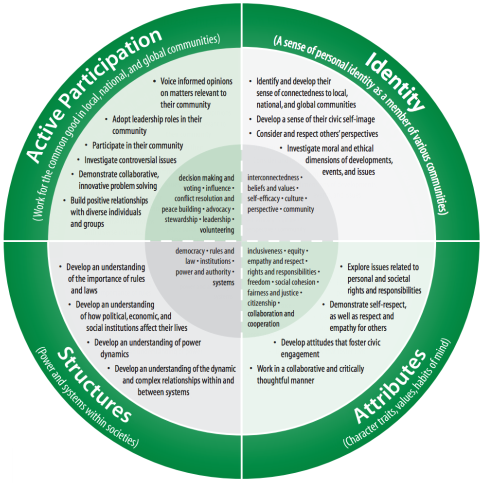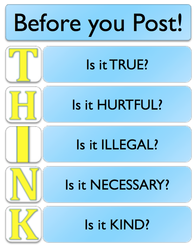Digital Citizenship
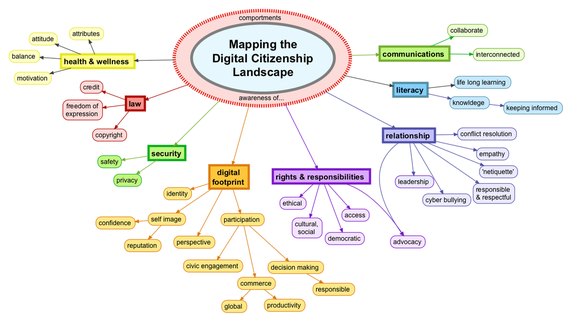
Digital Citizenship is a complex concept which often includes connections to health and wellness, legality, safety and security, digital footprint, participation, rights and responsibilities, relationships, literacy and communication. Citizenship includes an awareness of all these elements as well as comportment in digital spaces.
Digital Citizenship - Elements and Frameworks
|
The 2013 Ontario Social Studies, History & Geography curriculum document outlines a framework for Citizenship that can be re-visioned with digital technologies in mind. Key elements include
|
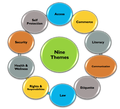
The Digital Citizenship network presents NINE themes of digital citizenship. These include digital access, digital commerce, digital communication, digital literacy, digital etiquette, digital law, digital rights and responsibilities, digital health & wellness, digital security and self protection. These encompass the concepts of RESPECT, CONNECT and PROTECT. More is available at THIS link.
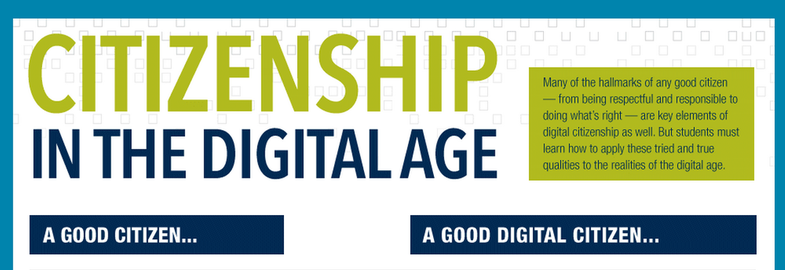
ISTE provides an infographic that can be used to contrast how being a good citizen compares to being a good digital citizen.
Ontario school and system requirements
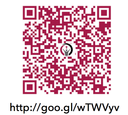
The Ottawa Catholic District School Board has produced a document Samaritans on the Digital Road that links digital citizenship to Catholic teaching. The document provides direction and lessons on the five topics in a variety of presentation formats (Smart Notebook, paper handouts, PDF).
- Being a citizen
- Being a digital citizen
- Participating in an online community
- On the road
- Show your learning
Code of Digital Conduct
Codes of conduct exist in every school and school district in Ontario. These are shaped by the Ontario Code of Conduct. From these codes of conduct come regulations and requirements for acceptable use in digital educational spaces as well as privacy, security and permissions. Linked into these documents will also be an awareness of Terms of Use and Privacy Policy from Web 2.0 tools. Take a moment to review some of these available documents and make sure you are informed for the school/school board where you teach.
Here is the link to some of the documents and resources available through a variety of schools/districts in Ontario:
- Catholic District School Board of Eastern Ontario - Acceptable Use Guideline for Internet Access
- Durham District School Board
- Hamilton Wentworth Catholic District School Board - St. Charles School
- Hamilton Wentworth Catholic District School Board - board document
- Niagara Catholic District School Board Electronic Communications System Policy
- Ottawa Catholic District School Board: Digital Citizenship; Samaritans on the Digital Road (document includes lesson ideas connected to digital citizenship)
- Peel District - Common Pages, digital citizenship and BYOD guidelines
- Simcoe County District School Board - ICT Appropriate Use Guidelines for Students
- Simcoe Muskoka Catholic District School Board - St. Antoine Daniel Catholic School (sample)
- Toronto District School Board
- Toronto Catholic District School Board - Acceptable Use Policy
- Waterloo Region District School Board Code of Digital Conduct
- Windsor Essex Catholic District School Board - Consent form for Internet/ Board use of student photograph or work; Acceptable Use Policy for Student; Student Agreement Form: Access to the Intenet;
- York Region District School Board
- York Catholic District School Board - Electronic Communications and Social Media (select document from drop down menu)
